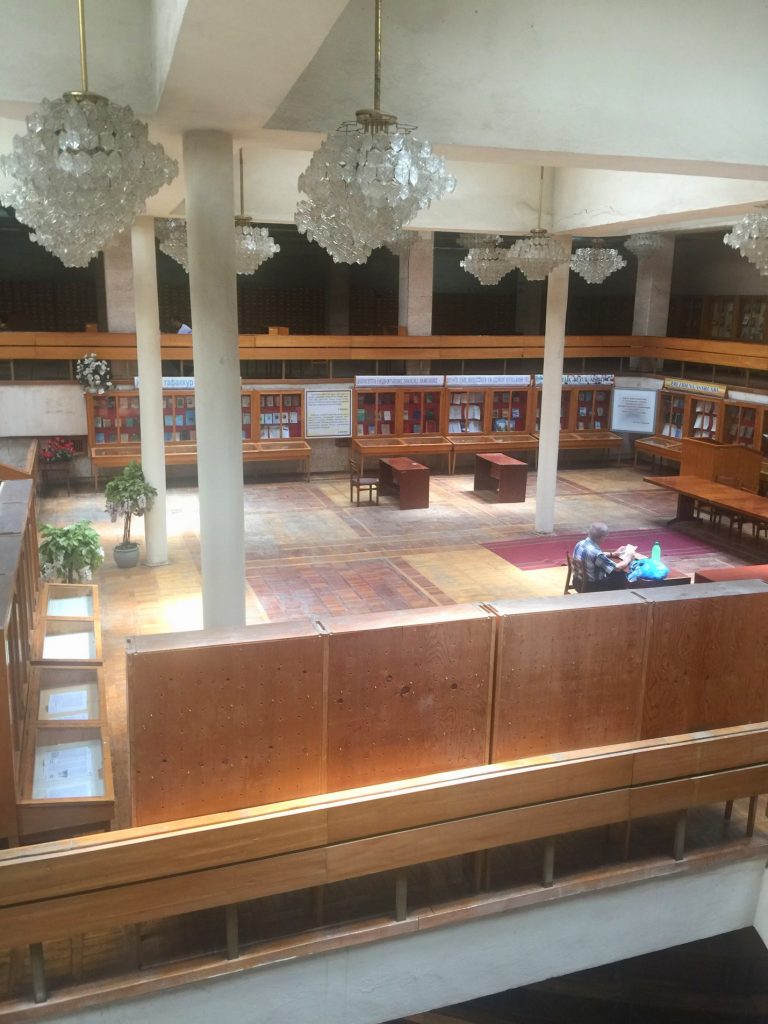
When historians discuss the travails of conducting research, most refer to the long hours of intellectual gymnastics required to complicate our understanding of the past. Others speak of the dreaded “writer’s block” that can plague its victim for hours or even days on end. Few historians, however, find themselves in non-air conditioned buildings in 110-degree heat shut out from the archival sources they obtained government permission to access.
But that’s exactly where Eren Tasar was this summer. Tasar traveled to Uzbekistan to begin research for his next book, an investigation of Soviet family law and law courts in Central Asia. This new project builds upon his previous work on political and legal institutions in the region in Soviet and Muslim: The Institutionalization of Islam in Central Asia. Yet unforeseen twists in the research experience completely reoriented his project.
Despite receiving approval from the Academy of Sciences and Ministry of Foreign Affairs to enter the country to conduct research, Tasar learned only days before his flight to Uzbekistan that he would be prohibited from accessing the archives. Stunned, but undeterred, he turned to the library system. First, he went to the Navoi library, a stone’s throw from the imposing former KGB building in Tashkent, in hopes of finding some useful material to salvage his research trip. Tasar found almost nothing on family law, but he discovered a trove on Soviet atheism listed in the card catalog. Unfortunately, only 1 of the 30 works on Soviet atheism in the publicly accessible library had been declassified.
Having exhausted all his primary leads, Tasar turned to the only other collection he could hope had relevant materials: the Library of the Academy of Sciences. However, since the building had been built without air conditioning, fragile documents could not be preserved here. Even more curious, only one other person was there with him – an elderly gentleman reading the complete works of the nineteenth century Austrian playwright, Franz Grillparzer (1791-1872), in Russian translation.
Sweltering in the heat, Tasar nonetheless made a surprising discovery: no authorities had thought to classify the collection because even local researchers used it so sparingly. Having abandoned his original plan to study family law and courts, Tasar identified a set of dissertations written between 1964 and 1984 during the height of Soviet “scientific atheism” from all five Central Asian Republics, a source base that could shed light on several unexamined aspects of Soviet Central Asia.
That historians have yet to analyze these sources should not come as a surprise given the many travails involved with garnering access to any historical documents in Uzbekistan. What drew Tasar’s attention was what they have to say about the history of contemporary Central Asia. The students who wrote these dissertations not only revealed much about the religious and political landscape of the region, but also lived through the end of Soviet Union’s officially atheistic regime and saw their career aspirations dashed in the economic turmoil that followed.
Tasar hopes this project will illuminate more than just the traumatic experiences of a few atheist Soviet academics, no matter how much he may sympathize with them after a summer spent roasting in search of source material. At present, most historical work about Soviet atheism focuses on the Russian context and suggests that Soviet atheism was meant to be a counterweight to or replacement of religious life in its practices “lifestyle.” The Central Asian experience, though, suggests otherwise.
In fact, Tasar has found that arguments about the “religious” nature of Soviet atheism are not confirmed in the historical record. Rather, he says that atheism was a “social sphere that intersects with rather than competes with religion.” Nor were Soviet efforts to establish atheism unsuccessful or completed through half-baked schemes. Instead, Tasar says, atheism was a “discursive sphere” that did not necessarily entail anti-religious policies or practices. Moreover, the dissertations that he located provide some of the only data about atheism and social life in the Central Asian countryside during the post-World War II period. In that sense, Tasar will be journeying into triply unexplored realms – Soviet atheism outside of Russia, never-before-used source materials, and the history of rural Soviet Central Asia.
Finally, Tasar’s story itself shows how historical research can be fraught with unexpected hurdles, dead ends, and even physical danger in unsuitable conditions. Though few historians can record these challenges in their publications, they, and their work, are ultimately shaped by the doors that are opened or closed to them, the politics of secrecy, and, sometimes, the boiler rooms of Tashkent libraries.
– Luke Jeske
